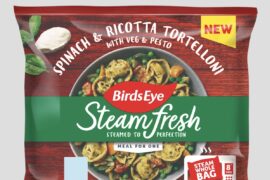Impossible Foods is now selling its plant-based faux meat products directly to consumers in the continental United States via a newly launched e-commerce website. The Redwood City, California-headquartered company’s Impossible Burgers are being shipped free of charge, and two-day home delivery is offered.
Options available include a convenience pack containing four 12-oz. packages going for $49.99; a combo pack featuring two 12-oz. packages and ten quarter-pound patties priced at $59.99; a family pack containing a single, five-pound bulk package for $64.99; and a grilling pack loaded with 20 quarter-pound patties for $69.99.

Impossible Foods has increased its retail footprint by nearly 20-fold since the start of 2020, and its flagship product is currently listed in over 3,000 grocery stores throughout the USA, including Albertsons, Fred Meyer, Gelson’s, H-E-B, Kroger, Ralphs, Safeway, Smith’s, Wegmans and more.
Impossible Burger sales have reportedly risen significantly during the coronavirus crisis, partially because of sporadic shortages of beef, pork and poultry items in parts of the country caused by temporary shutdowns of processing plants due to Covid-19 outbreaks. Many supermarkets and other retail outlets have imposed quotas on meat.
Grocery store demand for Impossible Burger broke records in March – then again in April and May. Impossible Foods plans to expand its retail footprint more than 50-fold in 2020 alone.
“With America facing meat shortages for the first time since World War II, we want to make it as easy as possible to get Impossible Burger – whether you shop in person at your local supermarket, with Instacart or other delivery services, or direct online,” said Impossible Foods’ President Dennis Woodside. “Shelter-in-place and social distancing restrictions due to Covid-19 altered our buying and eating habits – and many of these changes are permanent. Our intention is to make Impossible Burger available everywhere people shop and eat, including directly from our online store.”
The faux meat product has as much protein and bioavailable iron as a comparable serving of ground beef from cows. A four-ounce serving of Impossible Burger contains no cholesterol, 14 grams of total fat, 8 grams of saturated fat and 240 calories while, according to Impossible Foods, a conventional four-ounce “80/20” beef patty has 80mg of cholesterol, 23 grams of total fat, nine grams of saturated fat and 290 calories.
Impossible Burger contains no animal hormones or antibiotics, and is kosher, halal, and gluten-free certified. And because it’s made from plants and bioengineered, it reportedly uses 96% less land and 87% less water to produce, and emits 89% fewer greenhouse gas emissions compared to conventional beef from cows.

Last week Impossible Burger began rolling out at over 600 Albertsons-owned stores throughout the state of Colorado, the Pacific Northwest and the Southwest, with an additional 274 Acme and Safeway stores along the Eastern seaboard adding the product to shelves later in June.
Since the start of the pandemic, Impossible Foods has also launched collaborations with restaurants nationwide to sell Impossible Burger inventory directly to consumers.
Last month, the e-commerce grocery startup Cheetah began selling Impossible Burger with “contactless” pickups throughout the San Francisco Bay area, and the third-generation butcher Pat LaFrieda began selling the product through its eponymous website. In the Los Angeles area, Pink Dot started offering Impossible Burger third-pound patties directly to consumers through on-demand delivery with Postmates.
Impossible Burger made its grocery store debut in September of 2019. Privately held Impossible Foods was founded in 2011 by Dr. Patrick O. Brown, a professor emeritus of biochemistry at Stanford University and a former Howard Hughes Medical Institute investigator. Among investors in the company are Mirae Asset Global Investments, Khosla Ventures, Bill Gates, Google Ventures and HorizonsVentures.





